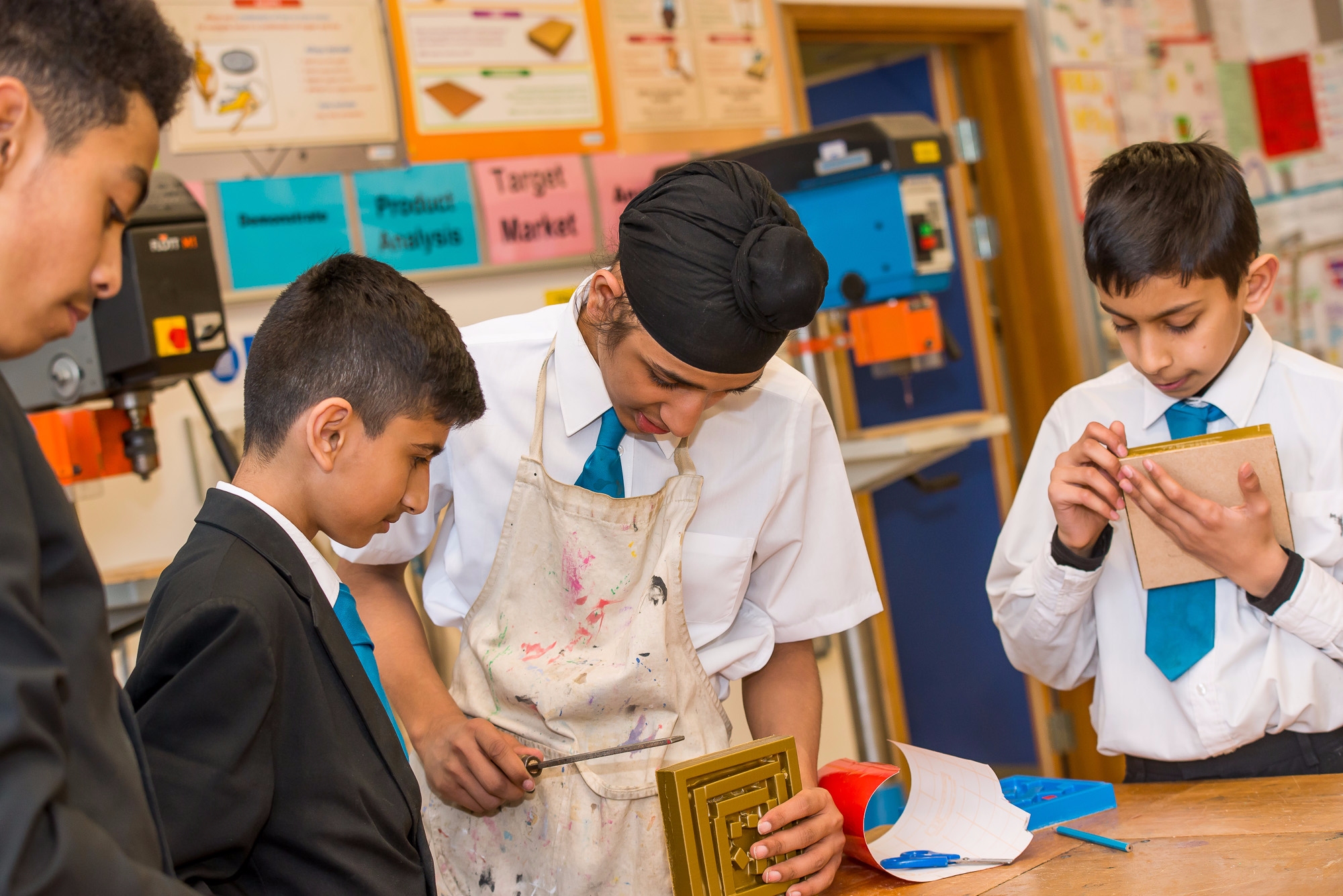Science
You are here:Key Stage 3 Science
The following 10 key ideas are delivered across year 7 to 9. These are Forces, Electromagnetism, Energy, Waves, Matter, Reactions, Earth, Organisms, Ecosystems and Genes. Each idea contains four smaller topics: the building blocks for the big ideas
Science is delivered with a strong emphasis of scientific enquiry in mind. The skills of planning, observing, analysing and communicating are developed. Students build up their knowledge through practical work, focussing on observations and conclusions formulated.
Science is taught in mixed ability groups where these key ideas are embedded through the synthesis of interactive theory and practical lessons. Mini assessments take place to ensure that we are meeting the learning and developmental needs of each student and that support can be provided in the right areas. In addition, there are 3 formal assessment dates within the academic year where practical and theory can be assessed.
A weekly STEM Club for Year 7 and 8 students will allow students to explore their love for science through a wide range of activities which support learning. This will be extended to Year 9 students in the 2nd term.
Key Stage 4
For Year 10 and 11 students they can chose between combined science (2 GCSEs) and Separate Sciences (3 GCSEs).
GCSE Combined Science
Why study GCSE Combined Science?
GCSE Combined Science is a combination of three science which complement each other. They give a broad and in-depth understanding of life and the environment, chemical process, and physical concepts. Students also develop their scientific skills through undertaking a series of required practical work.
What will I study?
The course will require the student to study concepts in Biology, Chemistry and Physics. These will be organised into distinct topics which include reference to developments in science. There will also be practice of scientific skills and evaluation of data and new theories.
How will I be assessed?
|
Exam Board |
AQA Trilogy 8464 |
|
Paper B1 |
Cell biology; Organisation; Infection and response; and Bioenergetics (16.7%) |
|
Paper B2 |
Homeostasis and response; Inheritance, variation and evolution; and Ecology (16.7%) |
|
Paper C1 |
Atomic structure and the periodic table; Bonding, structure, and the properties of matter; Quantitative chemistry, Chemical changes; and Energy changes (16.7%) |
|
Paper C2 |
The rate and extent of chemical change; Organic chemistry; Chemical analysis, Chemistry of the atmosphere; and Using resources (16.7%) |
|
Paper P1 |
Energy; Electricity; Particle model of matter; and Atomic structure (16.7%) |
|
Paper P2 |
Forces; Waves; Magnetism and electromagnetism (16.7%) |
|
Non-Examination Assessment |
Students will carry out practical activities alongside the course. Knowledge of this work will be tested for in the exams.
|
GCSE Separate Sciences
Biology/Chemistry/Physics
Why study GCSE Separate Sciences?
GCSE Separate Science is a suite of three science which complement each other. They give a broad and in-depth understanding of life and the environment, chemical process, and
physical concepts. Students also develop their scientific skills through undertaking a series of required practical work.
What will I study?
The course will require the student to study the GCSE content of Biology, Chemistry and Physics. Each will give them a separate GCSE. The additional content of the course in comparison to Combined Science engages students who will already have a keen interest in science. The course is taught as a series of concepts, practical work which develops scientific skill and evaluation of data and new theories.
How will I be assessed?
|
Exam Board |
AQA Biology 8461, Chemistry 8462, Physics 8463 |
|
GCSE Biology |
|
|
Paper B1 |
Cell biology; Organisation; Infection and response; and Bioenergetics (50%) |
|
Paper B2 |
Homeostasis and response; Inheritance, variation and evolution; and Ecology (50%) |
|
GCSE Chemistry |
|
|
Paper C1 |
Atomic structure and the periodic table; Bonding, structure, and the properties of matter; Quantitative chemistry, Chemical changes; and Energy changes (50%) |
|
Paper C2 |
The rate and extent of chemical change; Organic chemistry; Chemical analysis, Chemistry of the atmosphere; and Using resources (50%) |
|
GCSE Physics |
|
|
Paper P1 |
Energy; Electricity; Particle model of matter; and Atomic structure (50%) |
|
Paper P2 |
Forces; Waves; Magnetism and electromagnetism; and Space physics. (50%) |
|
Non-Examination Assessment |
Students will carry out practical activities alongside the course. Knowledge of this work will be tested for in the exams.
|
How will this course help me after my GCSEs?
From studying GCSE Separate Sciences, you may go onto a career in the sciences. The content of the course equips you to also build the foundations for understanding the natural world and an increasingly technological society. Typical careers include medicine, dentistry, optometry, and veterinary sciences. Including healthcare careers in nursing, physiotherapy, and sports science. The course develops all skills in terms of acquiring knowledge, analysis of data and evaluation of resources and methodology. Therefore, the study of separate science lends itself to many other careers which are not science based such as Law and Accountancy.
Key Stage 5
These are specialist A levels for students who would like to specialise in separate sciences for those seeking careers in STEM related subjects or to purse this at university.
|
A-level Biology (7402) AQA |
A-level Chemistry (7405) AQA |
A-level Physics (7408) AQA |
|
Paper 1 Written exam: 2 hours
Paper 2 Written exam: 2 hours
Paper 3 Written exam: 2 hours
|
Paper 1 written exam: 2 hours 105 marks 35% of A-level
Paper 2 written exam: 2 hours 105 marks 35% of A-level Paper 3 written exam: 2 hours 90 marks 30% of A-level |
Paper 1 Written exam: 2 hours
Paper 2 Written exam: 2 hours
Paper 3 Written exam: 2 hours
|
Subject Content |
||
|
A-level Biology (7402) AQA |
A-level Chemistry (7405) AQA |
A-level Physics (7408) AQA |
|
|
|
Please see links below for the KS3,4 and 5 Curriculum Intent and easy read curriculum maps, which explains what your child is learning and when throughout the year.




